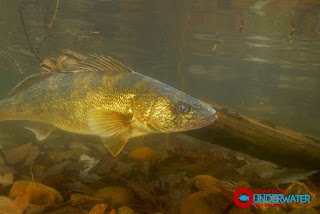It's been my experience that photographing walleyes underwater in their natural habitat can be either ridiculously easy or extremely difficult. I'm convinced that there's a lot of luck involved. As most fishermen can attest to, even finding walleyes in a lake can be a tough assignment. Some fish are especially sensitive to air bubbles from divers, and walleyes are one of these species that seem troubled by the unusual sound. They will usually move away quickly when they hear the sounds of a diver's air bubbles streaming to the surface. Other times, I've found walleye to be completely at ease with my approach, my bubbles, and my general presence. At these times I'm able to easily take close-up pictures with my cameras just inches from the fish. I've spent a great deal of time analyzing the various factors and conditions that sometimes make photographing walleye easy and sometimes make it impossible.
After 27 years of encountering walleye underwater, I still don't have a definitive answer. One theory I have is that if the fish feels secure, a close approach is possible. If there are predators nearby, a lot of recreational watercraft traffic, or any other kind of perceived threat or disturbance, they will be anxious, nervous, and "edgy". When the lake is quiet and they feel secure near a piece of cover, they seem to be more relaxed and at ease. I think it all has to do with a sense of safety. Fishermen believe walleyes always prefer deep water and avoid light because of their sensitive eyes. I don't think that's necessarily true, or the real reason why walleye seem to seek out deeper, darker water. On some of the quieter lakes I visit, they can be found in very shallow, brightly sunlit water close to shore. On busier lakes, they almost always seem to be in the deeper stretches. It could be that the perceived threat to their safety has more to do with locations walleyes are found than depth or brightness of the sun.
I work with many fishing magazines and exceptional walleye images are seemingly always in demand. Consequently, I've spent a great deal of time learning about walleyes and their behavior to gain a better understanding of how to best find and approach them to take their pictures. Certainly, being in the water with the fish gives you a glimpse of their "real" behavior-a snapshot few people ever see. Correctly interpreting what you observe is another matter and is the beginning of understanding and wisdom.
Like all animals, walleyes have many secrets and as we begin to learn more about their endlessly fascinating lives, we'll be able to appreciate them more and more for their inherent beauty and magnificence. I know I do.















No comments:
Post a Comment